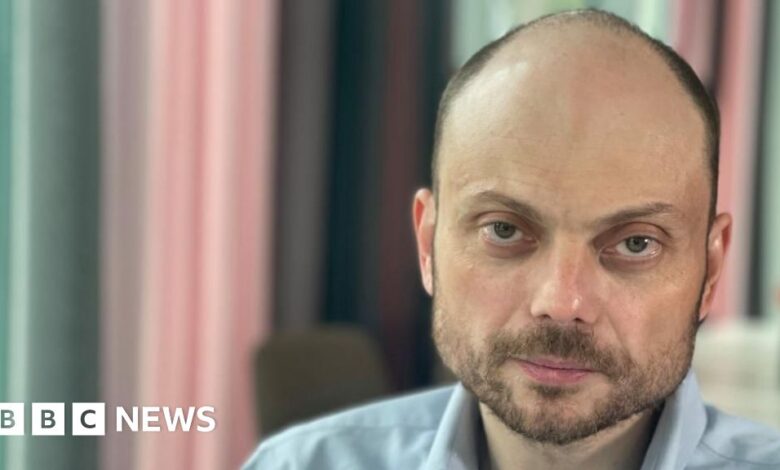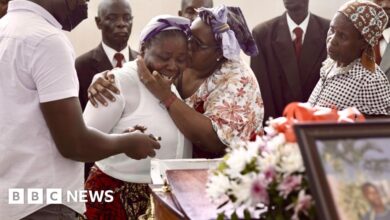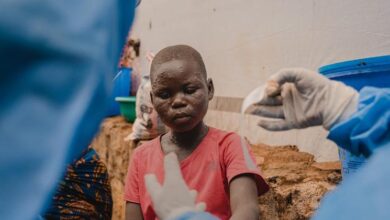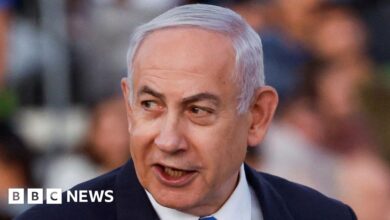Vladimir Kara-Murza thought he would die in a Russian prison

“I am absolutely certain that I will die in Putin’s prison.”
That was almost the first thing Vladimir Kara-Murza told me after his surprise release in the biggest prisoner swap since the Cold War.
The Russian opposition politician is painfully thin – from stress, he says. He is also still reeling from his abrupt transfer from a high-security prison in Siberia to forced exile, after more than two years behind bars.
“It was surreal, like I was watching a movie,” he described the feeling. “But it was a good movie,” in which he was finally reunited with the family he had not seen since his arrest in Moscow in April 2022.
His youngest son always followed him everywhere, not wanting to let him out of his sight.
Vladimir Kara-Murza, also a British citizen, was convicted of treason and sentenced to 25 years in prison for his strong and persistent condemnation of Vladimir Putin and the full-scale invasion of Ukraine.
He spent 11 months in solitary confinement, forced to make his bed at 5 a.m. every day and allowed only about an hour of paper and pen each day.
“It’s easy to lose your mind. You lose track of time, space. Everything really,” he revealed, in one of his first lengthy interviews since his release. “You don’t do anything, you don’t talk to anyone, you don’t go anywhere. Day after day.”
He was not allowed to call home and was only allowed to talk to his children twice in more than two years.
Additional punishments were even more severe physically.
Nearly a decade ago, Vladimir Kara-Murza nearly died from an unknown toxin and still suffers from the aftereffects, including neurological damage. In September, he now reveals, a prison doctor gave him “a year, 18 months at best” to live if he stayed behind bars.
“After being poisoned twice by the FSB, my health was no longer strong enough to endure the strict prison regime,” he explained with a wry smile.
Last week, Kara-Murza was one of eight Russian dissidents who went missing from prison.
As lawyers and relatives raised the alarm, rumors began to spread of an impending exchange. The prisoners themselves were unaware.
Instead, when the guards stormed Kara-Murza’s cell in Omsk, he thought he was going to be “led out to be shot,” he recalled. “I really thought they were going to execute me.”
He was recently instructed to sign a presidential pardon petition but has refused to beg for mercy from Vladimir Putin, whom he denounced as “a dictator, a usurper and a murderer”.
Kara-Murza was transferred to Moscow and the notorious Lefortovo FSB prison. Five days later, he was led out to board a bus and saw other dissidents inside, each with a hooded FSB guard.
Another guard took the microphone on the bus and announced that they were being taken for a prisoner exchange, without giving any details.
“Nobody asked us,” Kara-Murza said. “We were put on a plane like cattle and taken away by plane.”
The activist landed in Germany in the only civilian clothes he had: black long underwear and a T-shirt, along with the flip-flops he used to shower in prison.
Russian dissidents were among the “group” of political prisoners released, along with high-profile Americans such as journalist Evan Gershkovich.
The three were former activists in the camp of Alexei Navalny, the opposition politician who died suddenly in prison earlier this year. Navalny was initially part of the complicated exchange.
In return for the dissidents, Russia got a number of spies and criminals, including the prize Vladimir Putin was looking for: an FSB assassin named Vadim Krasikov, who killed people in broad daylight in a Berlin park.
The judge who sentenced him to life in prison called the killing an act of “state terrorism”.
“To all those who criticize this [swap]”I respectfully urge them not to think about exchanging prisoners, but to think about saving lives,” Kara-Murza argued, responding to the controversy over Krasikov’s release.
The killer was welcomed home with a red carpet and a hug from Putin himself.
“16 lives are not worth releasing one murderer?”
For a long time, Germany was uncertain. Kara-Murza argues that the delay may have been the reason Alexei Navalny lost his life.
The Kara-Murza family’s joy at reunion was overshadowed by thoughts of the Russian prisoners who were not released.
“I was so happy and moved to see these people free, but also so sad that so many were left behind,” his wife Evgenia told me. “I felt guilty.”
The human rights organization Memorial lists hundreds of political prisoners and she has campaigned vigorously for a priority group.
“There are people who are seriously ill, like Alexei Gorinov, who lost part of his lung, and don’t have much time.”
Her husband spoke of those “still languishing in Putin’s Gulag” and hoped for further exchanges.
He himself had been free for only five minutes when he was thrown into an argument.
In statements made shortly after landing in Germany, Vladimir Kara-Murza argued that sanctions related to the war in Ukraine should be better targeted.
Ukrainians immediately reacted angrily, believing that his priority in releasing him was to ease the punishment for Russia’s war.
Kara-Murza calls it calibration.
“I need more information,” he admitted. “I realize that February 2022 has changed a lot.”
But he wanted to know why a Russian human rights lawyer could not travel to the Baltic states to attend a conference, while a Russian missile carrying a Western-made chip could crash into a residential building in Ukraine.
“The responsibility for what the Putin regime is doing there lies with Russian society as a whole, much of which has chosen to turn a blind eye to abuses and repression,” he argued.
“But let us not forget the responsibility of Western countries that for many years still prefer to trade and do business with Vladimir Putin, although they know very well who he is and what he represents.”
In 2022, Vladimir Kara-Murza was arrested for insisting on staying in Russia and speaking out. Now banned from traveling, he worries about his right to call on others there to take action. He thinks he will feel “more restricted.”
But he continued to condemn the war in Ukraine.
“Putin cannot be allowed to win this war. Ukraine must win, and it needs more support from Western countries for that to happen,” he argued.
Historically, he said, the “opportunity” for democratic change opens up after “catastrophic military defeat”.
As his plane took off from Russia, the FSB security guard next to Kara-Murza told him to look out the window.
“He said that was the last time I would see my homeland,” the activist laughed. “I said, I am a historian, so I will definitely return to my homeland.”
“And it will be much faster than you think.”




